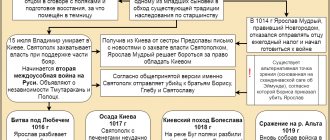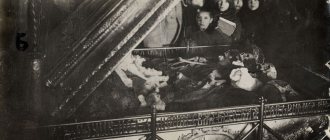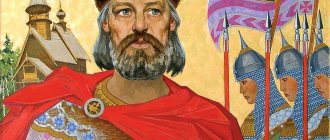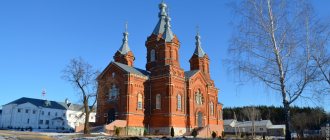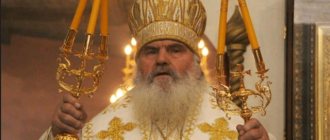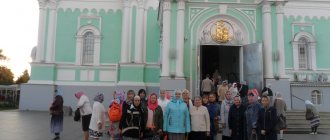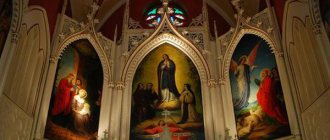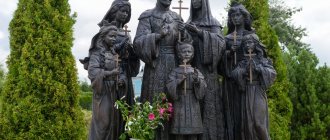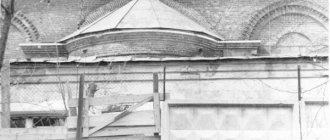On August 6, the Church honors the memory of the holy martyrs Boris and Gleb . The holy noble passion-bearing princes Boris and Gleb were the youngest sons of the holy Equal-to-the-Apostles Prince Vladimir of Kyiv. They were born shortly before the Baptism of the Russian Land and were raised in the spirit of the Christian faith. The eldest of the brothers, Boris, received a good education. Gleb shared his brother’s desire to devote his life exclusively to serving God. The brothers were distinguished by their mercy and kindness, imitating the example of their father, Prince Vladimir, who was merciful and sympathetic.
Life of Princes Boris and Gleb
Boris and Gleb were the sons of Grand Duke Vladimir (c. 960 - 07/28/1015) from his wife, the Byzantine princess Anna (963 - 1011/1012) from the Armenian dynasty, the only sister of the ruling emperor of Byzantium Vasily II (976-1025) .). At holy baptism, Boris received the name Roman , and Gleb received the name Davyd . From early childhood, the brothers were raised in Christian piety. They loved to read the Holy Scriptures, the works of the holy fathers. They ardently wanted to imitate the feat of God's saints. Boris and Gleb were distinguished by their mercy, kindness, responsiveness and modesty.
During the life of Prince Vladimir, Boris received Rostov as an inheritance, and Gleb received Murom. While ruling their principalities, they showed wisdom and meekness, caring primarily about inculcating the Orthodox faith and establishing a pious way of life among people. The young princes were skilled and brave warriors. Shortly before his death, their father, Grand Duke Vladimir, summoned his elder brother, Boris, and sent him with a large army against the godless Pechenegs. However, the Pechenegs, frightened by the strength of Prince Boris and the power of his army, fled to the steppes.
After the death of Vladimir the Great in 1015, his eldest son from a Greek woman, the widow of the Kyiv prince Yaropolk Svyatoslavich (? - 06/11/978), Svyatopolk (c. 979 - 1019) declared himself the great prince of Kyiv. Upon learning of his father's death, Prince Boris was very upset. The squad persuaded him to go to Kyiv and take the grand-ducal throne, but the humble Boris disbanded the army, not wanting internecine strife:
I will not raise my hand against my brother, and even against my elder, whom I should consider as my father!
Svyatopolk was a fairly insidious and power-hungry man, did not believe the sincerity of the words of his brother Boris and saw in him only a rival, on whose side the people were. Immediately Svyatopolk decided to commit a terrible crime, sending assassins to Boris. Boris was notified of this, but did not hide. Remembering the exploits of the first Christian martyrs, he readily faced death. The assassins sent by Svyatopolk overtook Boris at Matins on Sunday, July 24 (old style), 1015, in his tent on the banks of the Alta River. After the service, the criminals broke into the prince's tent and pierced Boris with spears.
Seal of Svyatopolk
The servant of Saint Prince Boris Georgy Ugrin rushed to the defense of his master, but was immediately killed. However, Boris was still alive. Coming out of the tent, he began to pray, and then turned to the murderers:
Come, brothers, finish your service, and may there be peace to brother Svyatopolk and to you.
Then one of the killers came up and pierced him with a spear. Svyatopolk's servants took Boris's body to Kyiv; on the way they met two Varangians sent by Svyatopolk to speed up the matter. The Varangians noticed that the prince was still alive, although he was barely breathing. Then one of them pierced his heart with a sword. The body of the passion-bearer Prince Boris was secretly brought to Vyshgorod and laid in a church in the name of St. Basil the Great.
After this, Svyatopolk decided to kill his younger brother, Gleb. Svyatopolk summoned Gleb from Murom and sent his warriors to meet him so that they would kill him on the way. At this time, Prince Gleb learned about the death of his father and the fratricidal crime of Svyatopolk. Grieving this, Gleb, like Boris earlier, preferred martyrdom to fraternal war. The killers met Gleb at the mouth of the Smyadyn River, not far from Smolensk. The murder of Prince Gleb occurred on September 5, 1015. The killers buried Gleb's body in a coffin consisting of two hollowed out logs.
Death of Vladimir
Already at the end of Vladimir’s reign, when he was seriously ill, the Pechenegs moved to Rus'. The prince ordered Boris to oppose them. He went on a campaign, but never met the enemy. Returning back, he learned that his father had died, but his older brother Svyatopolk was trying to hide this fact. Upon learning this, Boris burst into tears.
He immediately saw through his older brother’s insidious plan, realizing that he wanted to kill him, seizing all power into his own hands. Being a devout Christian, he decided not to resist. As a result, Svyatopolk managed to seize the Kiev throne. Boris did not listen to his warriors, who convinced him to oppose his brother.
The Kyiv throne was not enough for Svyatopolk; he decided to get rid of all the sons of Vladimir. To begin with, he ordered a squad of Vyshgorod men, led by Putynya, to kill Boris.
The latter at this time set up camp on the Alta River. He was waiting for his imminent death and prayed all evening in his tent. The next day he ordered matins from the priest. While he was reading prayers, the killers approached the tent. Hearing their unfriendly whisper, Boris understood everything.
The villains entered the tent with naked weapons in their hands and stabbed the prince with spears. Boris's servant, George, a Hungarian by nationality, tried to save him, covering him with his body, but only died himself. The warriors sent by Svyatopolk wanted to put an end to the mortally wounded Boris, but he began to ask them to stop to give him the opportunity to pray one last time. Having finished his appeal to God, he turned to his killers with words of forgiveness. The prince died on July 24.
Boris's body was taken on a cart, wrapped in a tent. When they reached the forest, he raised his head. Then the Varangians once again pierced his heart with a sword. Boris was buried in Vyshgorod.
The martyrdom of princes Boris and Gleb
The life of the passion-bearers Russian princes Boris and Gleb was sacrificed to the main Christian good deed - love. The brothers, by their will, showed that evil must be repaid with good. This was still new and incomprehensible to Rus', accustomed to blood feud.
Do not be afraid of those who kill the body but cannot kill the soul (Matthew 10:28).
Boris and Gleb gave their lives for the sake of obedience, on which a person’s spiritual life is based. “Do you see, brethren,” says the Monk Nestor the Chronicler, “how high is obedience to an elder brother? If they had resisted, they would hardly have received such a gift from God. There are many young princes today who do not obey their elders and are killed for resisting them. But they are not likened to the grace that these saints were awarded.”
The Russian passion-bearing princes did not want to raise their hands against their brother, but the power-hungry Svyatopolk was punished for fratricide. In 1019, the Kiev prince Yaroslav the Wise (c. 978 - 02.20.1054) - the half-brother of Boris and Gleb, one of the sons of Prince Vladimir, gathered an army and defeated Svyatopolk's squad.
The Legend of Boris and Gleb" (facial miniatures from Sylvester's collection of the 14th century). 1. Boris and Gleb are awarded crowns of martyrdom by Christ. 2. Boris goes against the Pechenegs
By God's providence, the decisive battle took place on a field near the Alta River, where Prince Boris was killed. Svyatopolk, called the Accursed by the Russian people, fled to Poland and, like the biblical fratricide Cain, did not find peace and refuge anywhere. Chroniclers testify that even his grave emanated a stench.
“From that time,” writes the chronicler, “sedition died down in Rus'.” The blood shed by the brothers Boris and Gleb to prevent internecine strife turned out to be the fertile seed that strengthened the unity of Rus'.
Veneration of Saints Boris and Gleb. Troparion, Kontakion and Canon
The noble passion-bearing princes Boris and Gleb are not only glorified by God for the gift of healing, but they are special patrons and defenders of the Russian land. There are many known cases of their appearance in difficult times for our Fatherland, for example, to Holy Prince Alexander Nevsky on the eve of the Battle of the Ice (1242), to Grand Duke Dimitri Donskoy on the day of the Battle of Kulikovo (1380). They also talk about other cases of the intercession of saints during wars and armed conflicts in later times.
Appearance of Boris and Gleb before the Battle of the Neva
The veneration of Saints Boris and Gleb began very early, shortly after their death. The service to the saints was compiled by Metropolitan John I of Kiev (1008-1035).
The Grand Duke of Kiev Yaroslav the Wise took care to find the remains of Prince Gleb, which had been unburied for 4 years, and buried them in Vyshgorod, in the church in the name of St. Basil the Great, next to the relics of St. Prince Boris. After some time, this temple burned down, but the relics remained unharmed, and many miracles were performed from them.
One Varangian stood irreverently on the grave of the holy brothers, and a suddenly emanating flame scorched his feet. From the relics of the holy princes, a lame youth, the son of a resident of Vyshgorod, received healing: the passion-bearing princes Boris and Gleb appeared to the youth in a dream and made the sign of the cross on his sore leg. The boy woke up from sleep and stood up completely healthy.
The noble prince Yaroslav the Wise built a stone five-domed temple on the site of the burnt church, which was consecrated on July 24, 1026 by Metropolitan John of Kyiv with a council of clergy.
The year of canonization of the holy passion-bearers is considered to be 1072. They became the first Russian saints. However, it is known that the Greek bishops, who at that time headed the Russian Church, were not particularly enthusiastic about the glorification of Russian saints. But a large number of miracles emanating from the relics of the holy passion-bearers and popular veneration did their job. The Greeks finally had to recognize the holiness of the Russian princes. In popular legend, the holy princes, first of all, appear as intercessors of the Russian land. In honor of the saints, many prayers were composed, including the unique, famous hagiographic Proverbs, which were preserved in Russian worship until the beginning of the 17th century.
The number of icons, copper castings and other images of Saints Boris and Gleb is enormous. In almost any historical museum dedicated to ancient Russian icon painting, today you can find icons of saints of various sizes and levels of icon painting skill.
Holy princes Boris and Gleb on horseback. Icon of the 14th century. Moscow, State Tretyakov Gallery
Holy princes Boris and Gleb on horseback. Icon of the 14th century. Novgorod State historical, architectural and art museum-reserve
Holy princes-passion-bearers Boris and Gleb. Beginning of the 14th century. Ukraine, Kyiv, Museum of Russian Art
Holy princes Boris and Gleb. Second quarter of the 14th century. Moscow, State Tretyakov Gallery
Holy princes Boris and Gleb. First third of the 17th century. Moscow, collection of the art gallery “Deja Vu” Saints Vladimir, Boris and Gleb with the life of Boris and Gleb. Icon, Moscow, first half of the 16th century. Tretyakov Gallery Holy princes-passion-bearers Boris and Gleb. Pskov icon XIV century. St. Petersburg, Russian Museum
The Old Believer icons of Boris and Gleb are also known. Thus, after the church schism, cast icons of saints, of which there are about 10 different versions, became widespread.
Old Believer icon of Boris and Gleb. XVIII century
There are also several cities and towns named after the saints.
The following days have been established for the veneration of Saints Boris and Gleb:
- May 15 - transfer of the relics of the holy martyrs of the Russian princes Boris and Gleb, named Roman and Davyd in holy baptism (1072 and 1115);
- June 2 - the first transfer of the relics of the holy martyrs Boris and Gleb (1072);
- August 6 - joint celebration of Saints Boris and Gleb;
- August 24 - transfer of the old shrine of the holy passion-bearers Princes Boris and Gleb from Vyshgorod to Smolensk (1191);
- September 18 - Dormition of the holy and blessed Prince Gleb, brother of Saint Boris according to the flesh (1015).
“...Barely touching the stones of Sinai,
the dark forest, the airy bread, saving their breadwinners at a quick trot, the horses of Boris and Gleb gallop.
The crafty devils are confusing their path.
Dahl wakes up in scattered sunshine. God is not responsible for either life or death. He who does not accept torment will never be saved.”
(B. Chichibabin “At Chernigov Night from the Ararat Mountains”)
Such a painful and complex, but unchangeable question for many generations and centuries: “Could there be a bloodless sacrifice?” Why is the atonement for sins washed with the blood of the innocent? And the immortality of the soul - through earthly torment? If you don’t find the full answer, then at least the story of the life and death of the noble princes Boris and Gleb helps to start the path to it. One of the first Russian martyrs and passion-bearers. With their feat they clearly demonstrated: only in Christ does loss in earthly life turn into victory in eternal life!
“...The devil, who hates the human race, seeing how people multiplied and spread throughout the earth, taught them to bow to idols, and not to God, who created heaven and earth. The good God, long-suffering and waiting for people to repent, sent His holy prophets to them. They didn’t listen to some and drove them away, and killed others...”
the Venerable Nestor the Chronicler
begins his “Reading about the life, murder and miracles of the blessed passion-bearers Boris and Gleb.” And, indeed, the story of Boris and Gleb is by no means a private fragment of internecine strife between brothers. Not only the story of human envy and selfishness of their brother Svyatopolk. It is not a story of mere submission by some and a brutal seizure of power by others. Rather, it is the story of the path that God gave to those to whom he pointed.
“...Blessed Boris was given the name Roman in baptism, because just as the Holy Spirit rested on Saint Roman from a young age, so the grace of God rested on him. The devil, seeing the grace and mercy given to him from God for all people and not tolerating it, got into his older brother, wanting to destroy the saint.
Saint Gleb was given the name David in baptism. So this child was marked by the grace of God from a young age. Do you understand this? He said that he was named David. But why? Just as the prophet David came out against the foreigner and delivered the sons of Israel from shame, so this holy David came out against the villain the devil and defeated him, and delivered the sons of the Russians from shame.”
(Nestor the Chronicler “Reading about the life, murder and miracles of the blessed passion-bearers Boris and Gleb”)
The story of the test that Boris and Gleb were destined to undergo is brought to us by lives, legends, historical and hagiographic works. Boris and Gleb were the younger half-brothers of Svyatopolk the Accursed and Yaroslav the Wise. All of them are the sons of the Kyiv prince Vladimir, the baptist of Rus'. However, one of the brothers was already different by birth.
“...His mother was Greek and was formerly a nun. Vladimir's brother Yaropolk, seduced by the beauty of her face, undressed her, took her as his wife, and conceived the accursed Svyatopolk from her. Vladimir, at that time still a pagan, having killed Yaropolk, took possession of his pregnant wife. So she gave birth to this accursed Svyatopolk, the son of two fathers and brothers. That’s why Vladimir didn’t love him, because he didn’t come from him.”
(Iakov Chernorizets “The Legend of Boris and Gleb”)
After the death of Vladimir's father, Svyatopolk, in fear of losing power, plots the murder of the brothers Boris and Gleb. And here’s an important point: no one is encroaching on his power! Brothers around 987–989 each received their own allotment from their father: Boris - Rostov, and Gleb - Murom. And they rule there peacefully. Moreover, having learned about Svyatopolk’s bad intentions, they do not plan to repel his attacks in any way, do not weave evil intrigues and do not wish him death. Because they see him as a good older brother. And they obey him completely.
“...And Boris thought: “If I go to my father’s house, then many will turn my heart to the idea of expelling my brother, as my father did before holy baptism, for the sake of the glory of the reign of this world. And this is all fleeting, perishable and more insignificant than a spider’s web. What did my father’s brothers and my father acquire, where is their life and the glory of this world, scarlet and feasts, silver and gold, wine, honey and meat, fast high horses, much property, tribute and honor without number and pride in one’s boyars. So Solomon experienced everything, saw everything, acquired everything, and, having examined everything, said: “vanity of vanities, all is vanity” (Ecc. 1:2); help only comes from good deeds, from orthodoxy and from unfeigned love.”
The primordial hater of good people, the devil, seeing that Saint Boris placed all his hope in God, began to exert a stronger influence on Svyatopolk, who, like Cain, burned with the fire of fratricide, planning to beat up all the heirs of his father and take over his power alone.”
(Dmitry Rostovsky “Lives of the Saints”)
It is surprising and incredible for us – children of the 20th century – to read the thoughts of Prince Boris at the most difficult and turning point of his life. We, who have been searching and not finding justice all our lives. We are so grumbling for every unkind word addressed to us. For every mistake we make, we strive to give “what we deserve” to our neighbor, friend, brother. To us - forever defending our rights before the powers that be, those who rule, those who lead. It is so difficult for us to understand this great humility of the prince. How every step and movement of Boris’s thought echoes the words of the Gospel. Like the savior, he had his own Garden of Gethsemane, and his own prayer “for the cup” and his own absolutely conscious decision to go to the end. By the will of the Lord.
“...Without mercy, the honest body of the holy blessed passion-bearer of Christ Boris was pierced.
- My dear and beloved brothers! Wait a little, let me pray to my God. Lord, merciful God, glory to You, for you have freed me from the temptations of this life. Glory to Thee, most generous giver of life, who has made me worthy of the suffering of Thy holy martyrs. Glory to Thee, Lord, lover of mankind, who has fulfilled the desire of my heart. You know, Lord, you know that I don’t resist, I don’t mind. Having in my hands all my father’s warriors and all his favorites, I did not think of doing anything evil to my brother. He rose up against me with all his might. If an enemy insulted me, I would endure it; if a hater humiliated me, I would hide. But You, Lord, look and judge between me and my brother. And do not hold him guilty of this sin, but accept my soul in peace. Amen".
(Dmitry Rostovsky “Lives of the Saints”)
However, such humility embittered the evil one even more. Seeing the fulfillment of his desire, Svyatopolk did not repent. He was afraid that the other brothers would find out about the murder and take revenge on him. It is truly said that to a lesser evil a greater one will be added. And whoever commits a crime once will not stop. Not because he doesn’t know his guilt and doesn’t understand the scale of what he’s done, on the contrary, he knows everything and is sure that he will never be forgiven. After all, he no longer knows the love of God. And he creates new evil, many times greater than the first.
“...When the boats drew level, the villains grabbed Prince Gleb’s boat by the rowlocks, pulled it towards them and began to jump into it, holding naked swords in their hands, shining like water.
- Most generous, most merciful Lord, do not despise my tears, but look with pity at the contrition of my heart. Look, Lord, and judge. “Behold, my soul is ready before You, Lord, and we send up glory to You, the Father and the Son and the Holy Spirit.”
(Dmitry Rostovsky “Lives of the Saints”)
Brothers killed. Goal achieved. And what? Where is the earthly truth? Here is Svyatopolk (now it is clear why history “awarded” him with the name “cursed” and forever related him to Cain) - in front of his possessions. He can rule and be great. But what is his destiny? Brother Yaroslav, having learned about what had been done to his brothers by Svyatopolk, could not leave the crimes unpunished. But death by dagger would be the least that would be just for the murderer. He was attacked by a serious illness, he was relaxed and could not stay in one place for long. Constantly rushed to run from pursuit. And he ran through the Lyash land, driven by the wrath of God, and reached the desert between the land of the Lyakhs and the Czechs. Here he lost his life and received retribution from the Lord. So in his earthly life he lost not only his reign, but also his life. And in eternal life - not only the Kingdom of Heaven and being with the angels, but also was given over to torment and fire. His grave remains. But an evil stench emanates from her. From that time on, sedition subsided in the Russian land, and Yaroslav gained dominance in Rus'.
...Centuries have passed. And now we are looking back from the confines of the 20th century and again asking the same question: “Could there have been a bloodless victim?” The most important answer to this is given by history itself.
Where are the names of those who committed the great crime now? N.M. Karamzin, for example, in “History of the Russian State” names the murderers: these are Putsha, Talets, Elovich, Lyashko. But they are known only to chroniclers, historians, and hagiographers.
Where are the passion-bearers Boris and Gleb now? With us, in our reality, in our lives! By your feat and the power of your faith. As the Evangelist said: “A city standing on top of a mountain cannot hide. And when they light a candle, they do not put it under a bushel, but on a lampstand, and it gives light to everyone” (Matthew 5:14, 15). So the Lord made these saints to shine in the world and shine with many miracles in the Russian country, where many suffering people received salvation. The blind began to see, the lame received the speed of a chamois, the bent were straightened. How many churches and monasteries have forever made the names of the murdered immortal:
— Boris and Gleb Cathedral in Chernigov (1123)
— Boris and Gleb Church in Kideksha near Suzdal (1152)
— Boris and Gleb Church in Polotsk (mid-12th century)
— Boris and Gleb Church in Novgorod (1167)
— Kolozha Church in Grodno (1180-1190)
And many, many others. Such a number of churches in honor of saints in the Middle Ages were not dedicated to a single ascetic. Through their feat and their unceasing prayer, the holy martyrs Boris and Gleb are with us forever!
“...Now and ever, along the steep slopes of the Sinai, across the Russian field into the Russian sky, without crushing a single spikelet, the horses of Boris and Gleb gallop.”
(B. Chichibabin “At Chernigov Night from the Ararat Mountains”)
Library of the Russian Faith Canon to the Holy Martyrs Boris and Gleb →
Read online
Troparion, tone 2
A truthful passion-bearer, and a true listener to the Gospel of Christ, chaste Romane, with the kindly Davyd, without resisting the enemy, I am a brother who kills the body, but cannot touch the soul. Let the evil power-hungry weep, but you, rejoicing with the faces of the angels, stand before the Holy Trinity. Praying for the power of your relatives to be pleasing to God, and for your Russian sons to be saved.
Kontakion, tone 3
Today is the glorious memory of the noble passion-bearer of Christ, Roman and David, calling us to the praise of Christ our God. Therefore, the gift of healing that flows to the race of relics is acceptable, through the prayers of the holy Vayu, you are a divine physician.
